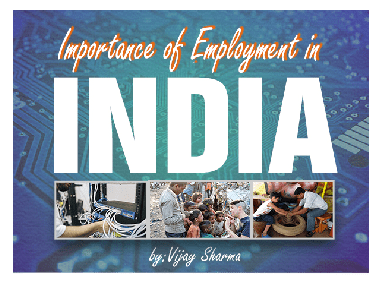




What Does Employability Mean?

Defining the Term Employability
To increase one's employability throughout a lifetime and weather the job market's ups and downs, one must continually learn and use new information, gain new experiences, and hone their abilities. It's not the same as working, but having one is necessary to get a job.
The term "employability" refers to a person's potential to secure and maintain gainful employment and move quickly between positions within the same organisation or profession or in a new one, as the individual sees fit and as market and other external factors require.
Generally speaking, one's employability will rise or fall as the economy improves or worsens, with occasional exceptions in healthcare, education, and the military. The capacity to get, keep, and change jobs over time is crucial to anyone's survival and success in life. Therefore, this applies to almost everyone in the labour sector. Hence, skills applicable in the modern job market are a need.
Understanding the Economy and Employability

Meaning of Economy and Employability
Labour and human capital are two production factors that may be used in the good’s production of goods or the delivery of services. As per the importance of labour economics, human capital refers to professionals with advanced degrees, whereas blue-collar labour typically refers to unskilled people.
Both human capital and available labour are in short supply. Effective labour/human capital use requires investing in their education and training necessary to develop the knowledge, skills, and talents valued by today's knowledge-based economy.
To maximise profits for their shareholders (through things like stock price growth and dividend increases), firms and businesses are running leaner than ever, with fewer organisational layers. As a result, they are prone to rapid restructuring to serve their constituents better, respond to shifting market demands and compete in today's dynamic marketplace.
Even in government, this reduces the necessity for positions that are just repetitive and bureaucratic. Maintaining and improving your employability is crucial to your success in life. Lack of employment opportunities reduces labour force productivity and leads to frictional and structural unemployment from a macroeconomic standpoint. A country's aggregate demand and GDP are two indicators of its economic growth potential and quality of life that are affected by this.
Consumer spending is the most critical factor in stimulating production and employment. Without customer revenue, businesses cannot fulfil customer demand for their products and services. It means a sluggish economy and rising unemployment, which are precursors to a recession. Due to this, the capacity to find a gainful role in employment is critical to the economy's health and the fabric of society.
Economists and politicians have argued that training and education improvements may protect employees in the blue and white-collar sectors against automation and outsourcing. Human capital, or "skilled white-collar labour," consists of people who have completed at least some college and can use their education and training to do well in professional occupations, most of which are performed in an office environment.
Potential Employment Factors

Factors Responsible for Employment
Multiple in employability may be broken down into primary and secondary groups. However, employers and workers are the primary players in this drama.
Secondary actors include K-12, 2-year and 4-year institutions and universities, the students and faculty who attend them, and any laws that will affect the educational system, the workforce, and employers.
Is the presence of labour unions also seen as influencing a person's chances of getting a job? The response depends on the kind of occupation, such as blue-collar employees and whether or not they are influenced by labour unions, such as white-collar workers, management, etc., depending on union talks with employers/management.
Since your employability is related to that of other job seekers, it is also impacted by the employability of others competing with you for jobs. When applying for a particular sort of work or position, your chances of being hired are not boosted if there is a large pool of other applicants who are as qualified.
Will India's Unemployment Rate Rise? Case Study
In September, India's jobless rate fell from 8.32% to 6.86%. The Centre for Monitoring Indian Economy (CMIE) estimated that 8.5 million new employment were created in September, most of them in rural India. According to CMIE, India's employment rate rose to 37.87% in September from 37.15% in August. India's rural employment rate rose 0.85% in September from August to 39.53. Urban India's employment rate rose to 34.62% from 34.15% in August. In September, rural India's unemployment rate was 6.1%, lower than urban India's 8.6%.
In September, CMIE reported that 76.5% of the 8.5 million new workers were from rural India. That's high in rural regions with little agricultural labour demand. Agriculture added 0.55 million employment during the month, but non-farm rural jobs, largely building and production, increased by six million.
According to the CMIE, the construction sector in rural India added 7.5 million jobs in September due to consistent spending on road development and a likely rise in employment under the rural employment guarantee plan. In September, rural India's industrial sector added 4.7 million jobs. Food industries added 2.16 million employment, metal added 1.5 million, and textiles added 0.2 million.
Retail, personal, non-professional services, education, and travel & tourism provided 6.8 million employment in rural India. According to the CMIE, creating 6.5 million rural jobs in September reduced rural unemployment by 4.6 million to 18.1 million from 22.7 million. CMIE said that most rural new employment was daily wage occupations.
Conclusion
Employability is a fluid notion with many actors and components that affect your ability to search, secure and keep gainful work throughout time. It's impacted by training, education, IQ, culture, socioeconomic prejudices, and politics.
If all or most employability components are included in the educational curriculum, can education be used to promote employability? If yes, can this be assessed using quantitative and qualitative ways to show the potential improvement of educating pupils about these components?
High-employability persons are confident in their ability to take effective and appropriate action, articulate their goals, live and work effectively with others, and continue to learn from their experiences.
FAQs on Employment and Its Connection with Economics
1. Why is it beneficial to the economy to create new jobs?
The importance of employment creation is beneficial in terms of gross domestic product. When someone is employed, that person receives compensation from their employer. This allows people to buy necessities like food and clothes and indulge in activities like entertainment. When there is a rise in a good or service, manufacturers boost production to match the demand. Business organisations do this by increasing both capital expenditures and personnel counts. More money enters the economy when more people join the labour force, and the demand spiral continues to rise.
2. What exactly does It mean to be employable?
Employability is a concept that refers to the many skills, experiences, and knowledge that you have accumulated throughout your life that make you an attractive candidate for a lucrative job. When opting out whether or not to hire someone, potential employers will consider how employable they believe you to be. If the company hired you, their choice would be influenced by what they think you could contribute to the company.
3. How can one improve his/her chances of finding employment?
A person's marketability to future employers increases with their level of education, experience earned on the job, and overall personal development. Your employability will increase if you participate in activities that broaden your knowledge and expand your skill set and potential employers believe these activities will benefit their company. Reading a book, taking part in an internship, or enrolling in courses are all viable options for the ones who want to boost their employability and increase their chances of finding work.























